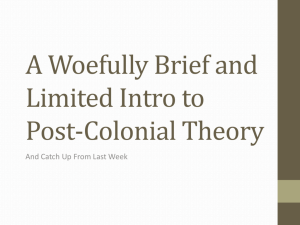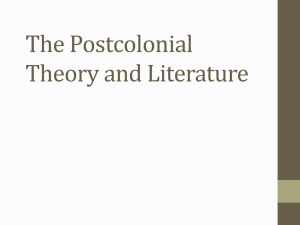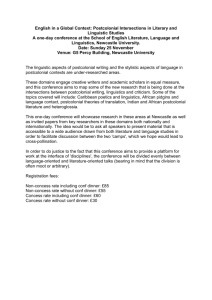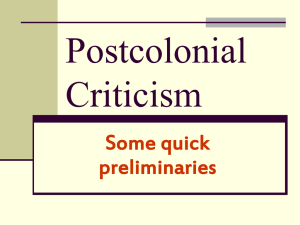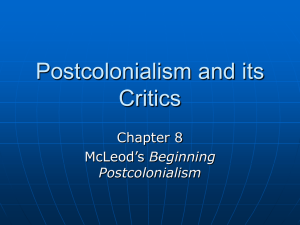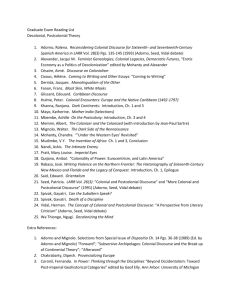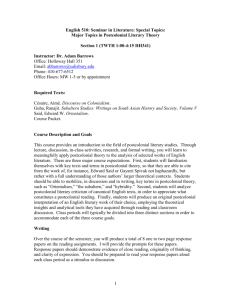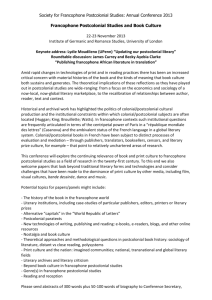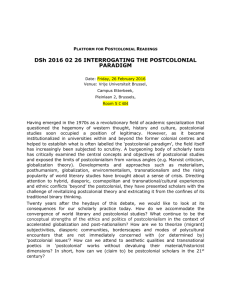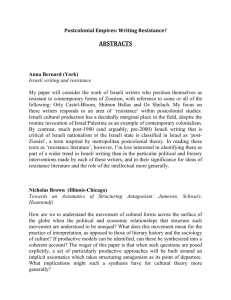File
advertisement
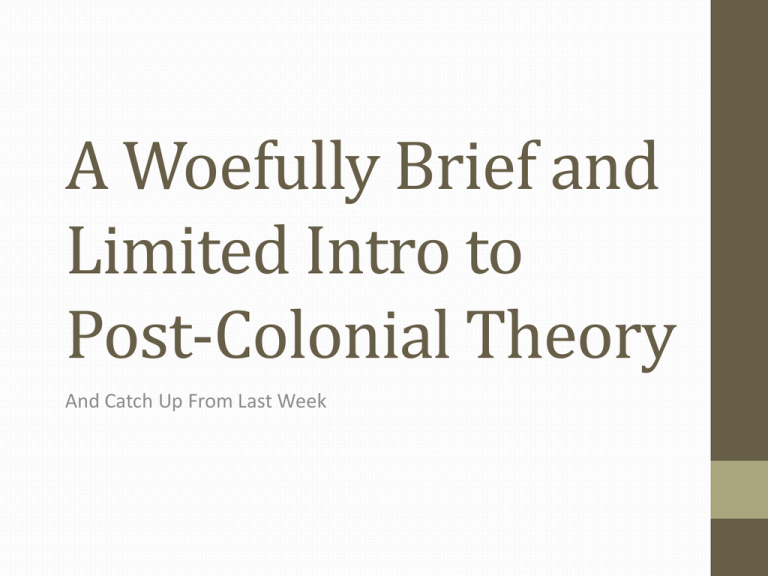
A Woefully Brief and Limited Intro to Post-Colonial Theory And Catch Up From Last Week Announcements: • Homework and it’s impact on your grade. • Essay 2 is on its way. • IF YOU HAVE QUESTIONS OR CONCERNS ABOUT THE RESEARCH PAPER, PLEASE COME SEE ME • Pass out an extra copy of the research paper prompt. PostColonial Theory • [Briefly read selections from the Intro in Textbook] • Focuses on the reading and writing of literature written in previously or currently colonized countries. • The Postcolonial theory is a term that refers the theoretical and critical observations of former colonies of the Western powers and how they relate to, and interact with, the rest of the world. • Greatly interested in the cultures of the colonizer and the colonized, postcolonial theory seeks to critically investigate what happens when two cultures clash and one of them ideologically fashions itself as superior and assumes dominance and control over the other. Post Colonial Theory Continued • The field of postcolonial studies has itself been hotly contested ever since its rise in the 1970s. • Similar to how feminist critics often focus on writing by women that has been historically ignored or thought unimportant, postcolonial critics often focus on writing by people from colonized cultures—either during or after colonization—and examine the (often destructive) ways in which the colonizing or dominating culture influenced or erased the colonized culture. Post-Colonial/Postcolonial • The hyphenated term (-) Postcolonial implies the effects of colonialism on cultures after the end of colonialism, such as the legacy of Eurocentric modernity. Gandhi, Leela .1998. Postcolonial Theory: An Introduction • The run-on term Postcolonial refers to the effects of colonialism on cultures from the beginning of colonialism to the present date. Ashcroft et. al (1989) Empire Writes Back The 3 Pillars of Postcolonial Theory 1. Edward W. Said 2. Gayatri Chakravorty Spivak 3. Homi K. Bhabha Edward Said • Probably the most important figure for the rise of postcolonial studies and theory. • Born in 1935 in Jerusalem and dies 2003 • Palestinian-American scholar, critic, and writer • Said, raised as an Anglican, attended a British school in Cairo then at Princeton and Harvard, he became an academic literary critic. • From 1963 until his death he was a professor of English and comparative literature at Columbia University in New York. Edward Said continued • His 1978 book Orientalism reevaluated an entire historical tradition of European-American thought, examining the relation of political power to the representation of the world, and generated an entire field of cultural and postcolonial studies as well as informing the thinking of scholars in every area of cultural, social and historical work. • Other significant books include The Question of Palestine (1979), Covering Islam (1981), The World, the Text and the Critic (1983), Culture and Imperialism (1993), The Politics of Dispossession (1994), Representations of the Intellectual (1994), Peace and Its Discontents (1995), The End of the Peace Process (2000), Reflections on Exile (2000) and Humanism and Democratic Criticism (2004). Orientalism • Illustrates Asian and Islamic Cultures during European imperialism and Europe’s goals of maintaining power and domination of non-Europeans • He argued that Europe used the Orient and imperialism as a symbol of its strength and superiority. • “Said suggested that Orientalists are treated as others—in this case, Muslims and Asians—and as objects defined not in terms of their own discourses, but solely in terms of standards and definitions imposed on them from outside. Among the influences underlying these definitions was, in Said's view, a long-standing Western concern with presenting Islam as opposed to Christianity. Gayatri Chakravorty Spivak • Gayatri Chakravorty Spivak was born in 1942 • Is thought of as one of the three co-founders of postcolonial theory. • Her main work on the postcolonial theory was her Critique of Postcolonial Reason: Toward a History of the Vanishing Present (1999) • Her work combines Marxism, feminism, and deconstruction. Homi K. Bhabha • He wrote the Nation and Narration (1990) • This considers how to conceptualize the nation under colonialism and, by default, in postcoloniality. • Here he takes issue with the anthropologist Benedict Anderson's view of the relationship between imperialism and its resistance in Imagined Communities (1991). Places that produce literature often examined in Postcolonial Studies • Latin America • Africa • East and Southeast Asia • South Asia • Carrabin • Polynesia • United States From Last Week: • If you are interested in Queer Theory, I have uploaded a power point to supplement what you have read in your textbook. • I have also uploaded a student example research paper that uses queer theory to discuss a film: “Fried Green Tomatoes” Major Change To Schedule: • I’ve decided that we are (sadly) going to drop our day on American Multiculturalism in favor of giving you all time to have a peer review of your Research Paper so far. • Last Thursday I asked you to bring in an introduction/tentative thesis statement and at least 2 sources BUT class was cancelled due to this damn flu. • This Thursday, I am cancelling the readings and the homework and I want you to focus on your Research Papers. • Bring in either • A rough draft (2-3 pages) • A detailed outline + an introduction, thesis, and at least 2-3 critical sources. Once Again, for Thursday • Topics: Cultural Theory: American Multiculturalism, Identity Politics, and Border Theory Homework Due: · Read “American Multiculturalism” p. 1236-1238 · Read excerpt from “Borderlands/La Frontera” (handout) · Read Short Story: “Pilon” p. 77 · Read Poem: Sherman Alexie “Evolution” p. 452 • New Due: • Research Paper Progress Check and Peer Review. Bring In: • A rough draft (2-3 pages) • OR • A detailed outline + an introduction, thesis, and at least 2-3 critical sources.

